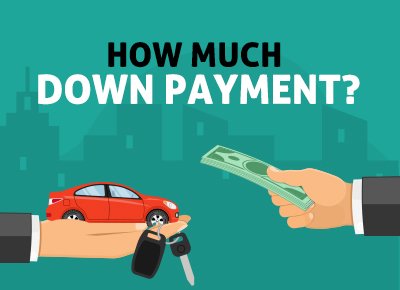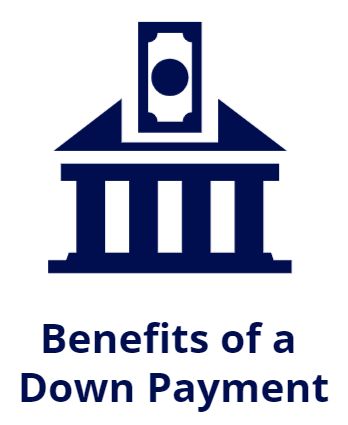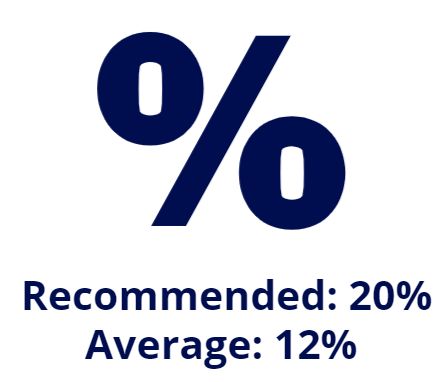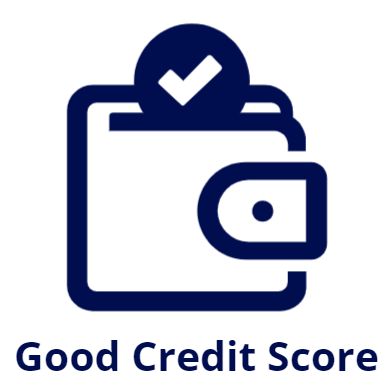How Much Money Should You Put Down on a Car?
September 22, 2020
I am a serial entrepreneur and a consumer advocate. When I’m not helping car buyers, I love working on ventures that have a positive impact. I run a cause marketing agency and serve on the board of Vayu Global Health where we are disrupting the medical industry and preventing the needless deaths of mothers and babies during childbirth.

Similar to buying a house, buying a car often requires a down payment. When you buy a new or used car from a dealer, you will need to put down a payment, unless you're able to buy the car outright in cash.
There are several factors that determine how large of a down payment you should make for your unique car-buying situation.
In this post, we will break down the considerations for how much money you should put down on a car.
Table of Contents
- Down Payments for Leasing and Loaning
- What's the Difference Between a Down Payment and a Deposit?
- Is Putting Money Down on a Car a Good Idea?
- What Percentage Should I Put Down on a Car?
- A Large Down Payment Isn't Always Better
- Are Zero Down Deals Too Good to Be True?
- Can I Get My Down Payment Back on a Car?
- Do I Need to Make My Whole Down Payment in Cash?
- How to Build Up Your Down Payment
- Best Car Deals by Category
- Frequently Asked Questions
Down Payments for Leasing and Loaning
The first thing to understand about down payments for a car is that you'll most likely need to have one when you lease or finance a car. The money you put down for a vehicle you're leasing is called the "capitalized cost reduction". The more money you put down when leasing, the lower your monthly costs are. However, that is money you won't get back if the vehicle is stolen or totaled.
On the other hand, the money you put down when financing a car goes toward your ownership. The greater your down payment is, the closer you are to owning the car. Therefore, a larger down payment also decreases the amount of interest you pay overall.
What's the Difference Between a Down Payment and a Deposit?
Don't confuse a down payment with a car deposit. A down payment is a portion of the total car price that is paid upfront and is not included in the amount financed or your lease payments. While a car deposit is an amount paid to hold a car and prevent the dealer from selling it to someone else, or to reserve a factory order car. A deposit is typically applied to your purchase price.
Is Putting Money Down on a Car a Good Idea?
There are several advertisements for loans with no money down, but it's important to remember that those deals often have very difficult caveats. In most cases, it is smartest to put down money when buying a car.
 Benefits of a Car Down Payment
Benefits of a Car Down Payment
- You prove your financial stability to a lender. Lenders must assess your likelihood of paying back the car loan. Putting down a substantial payment will make you seem more financially credible to the lender, especially if you have a low credit score.
- The chance for a lower interest rate. When calculating rates, many finance companies consider the down payment as one of the factors. If you also have a good credit rating, you may be able to get a lower interest rate. If you finance through the dealer instead, you may qualify for special deals and promotions based on a large down payment.
- Protect yourself against depreciation. New cars greatly depreciate in the first year after the sale. You could end up upside down in your loan if you total the new car or need to sell it soon after buying it. Your down payment will reduce what you owe back on your loan.
- Lower monthly payments. The money you put toward the car at the time of purchase will go toward your ownership when financing. This means that the more money you put down, the less you pay each month, and the easier it may be for you to pay off your loan or get out of your lease early.
What Percentage Should I Put Down on a Car?
 Clearly, a down payment is very helpful. But how much should you put down? Conventionally, people say 20%, but most people make far smaller down payments, closer to 12% on average.
Clearly, a down payment is very helpful. But how much should you put down? Conventionally, people say 20%, but most people make far smaller down payments, closer to 12% on average.
For car leases, there may be a specific amount of cash due at signing which is predetermined. There may not be a lot of leeway on what you can put down on a lease, so you'll likely have to pay the predetermined amount.
When buying a car, you have to find the sweet spot for a down payment. Essentially, you have to consider your own financial situation. When financing, it's ideal to put down as much as you can without stretching yourself financially thin. If you have the funds to pay 20% down and still keep a comfortable savings, then it's a good idea. However, putting down 10-12% is better than emptying your bank account entirely.
A Large Down Payment Isn't Always Better
Most often, the larger your down payment, the better. However, this isn't always true. Finance companies typically have a minimum loan amount. You cannot put down such a large down payment that you fail to reach the minimum. Lenders set minimums to ensure they will make a profit from the loan. If you can put down so much money that you do not meet the minimum loan requirement, then you may be better off shopping for a slightly less expensive car and paying for it in cash entirely.
Are Zero Down Deals Too Good to Be True?
 You've likely seen many zero down deals and special offers. While these sound enticing, you should be aware of the risks. For one, only well-qualified buyers with incredible credit qualify for these offers. Also, when you don't put anything down, you are susceptible to higher interest rates or ending upside down in your loan. It's not always a bad choice to take a zero down deal, but you must be very careful to assess the extra costs added to the loan.
You've likely seen many zero down deals and special offers. While these sound enticing, you should be aware of the risks. For one, only well-qualified buyers with incredible credit qualify for these offers. Also, when you don't put anything down, you are susceptible to higher interest rates or ending upside down in your loan. It's not always a bad choice to take a zero down deal, but you must be very careful to assess the extra costs added to the loan.
Recommended: Learn more about how to negotiate a zero down lease.
Can I Get My Down Payment Back on a Car?
You may be able to get a car down payment back, but that’s not always the case. Remember the difference between a down payment and a deposit. The down payment goes toward the vehicle’s value, whereas the deposit holds the vehicle until purchasing.
Most often, you cannot get a deposit back, but you can get a down payment back for a car purchase. You will not be able to get the down payment back for a lease, which is why you should be smart about how much you put down for a lease.
Be sure to find out the rules for down payment refunding before leaving one or signing any contract.
Do I Need to Make My Whole Down Payment in Cash?
No. Many buyers use other acceptable forms of down payments for their cars. If you already have a car, this is one asset you can use towards the down payment. Many dealers will allow you to trade-in the car and deduct the amount directly from the purchase price of the new vehicle. This often works for new and used car loans and car leases.
Other times, you can use rebates toward your down payment. Dealers will sometimes offer rebates for financing a new vehicle from that brand. Apply the rebates to your purchase as cash down to boost your overall payment and help reduce the monthly cost.
Finally, some dealers will let you put your down payment on a credit card, up to a certain amount, usually not more than a couple thousand dollars.
How to Build Up Your Down Payment
Building up your down payment is the best way to ensure you can put a reasonable amount down on your car. Here are some tips for saving money and building your down payment:
 Assess your budget. First, you need to decide a realistic amount that you can afford for a car loan. Of course, the more you are able to put down, the less you'll have to finance.
Assess your budget. First, you need to decide a realistic amount that you can afford for a car loan. Of course, the more you are able to put down, the less you'll have to finance.- Price compare car loans. To calculate your down payment, you'll want to shop around for car loans from different lenders. Review the terms like any minimum payment or loan terms and if there are penalties for paying it off too early. Dealerships, credit unions, and banks may all have drastically different interest rates and terms.
- Start saving. Consider making a separate saving account for your down payment. Put some money away each month until you have enough for your approximate down payment.
- Shop around. Don't get yourself too set on a specific make or model. You may be able to find a more affordable car by buying an older or used vehicle, checking out similar models, or finding a different brand.
Determining your down payment for a car is all about your budget and the car you want. Consider your finances, lending options, and how much the down payment will impact your monthly payments.
Best Car Deals by Category
Frequently Asked Questions
Should I put down money on a car?
Yes! Putting money down can lower your monthly payments, reduce your interest rates, and prevent you from ending upside down in your loan.
What percentage is a good down payment on a car?
The rule of thumb is to put 20% down on a new car and 10% down on a used car. However, the average down payment for a new car hovers just below 12%. You have to assess your personal budget, financing options, and loan terms to decide what to put down.
Are zero-down deals too good to be true?
Zero down deals often have several caveats. You typically need an extremely high credit score to qualify and will have to look closely for additional monthly costs.
How much is too much for a car payment?
You should not pay more than 10% of your monthly income on your monthly payment. That means, you will need to put down enough money to ensure your monthly payment is less than 10% of your monthly income.
Do car dealers accept personal checks?
Most dealerships accept personal checks for a car purchase or down payment. You will not have to get a cashier’s check or money order to purchase from a dealership. However, dealerships will not accept temporary checks or checks from a party who is not the buyer.
Posted in Car Buying Tips |




